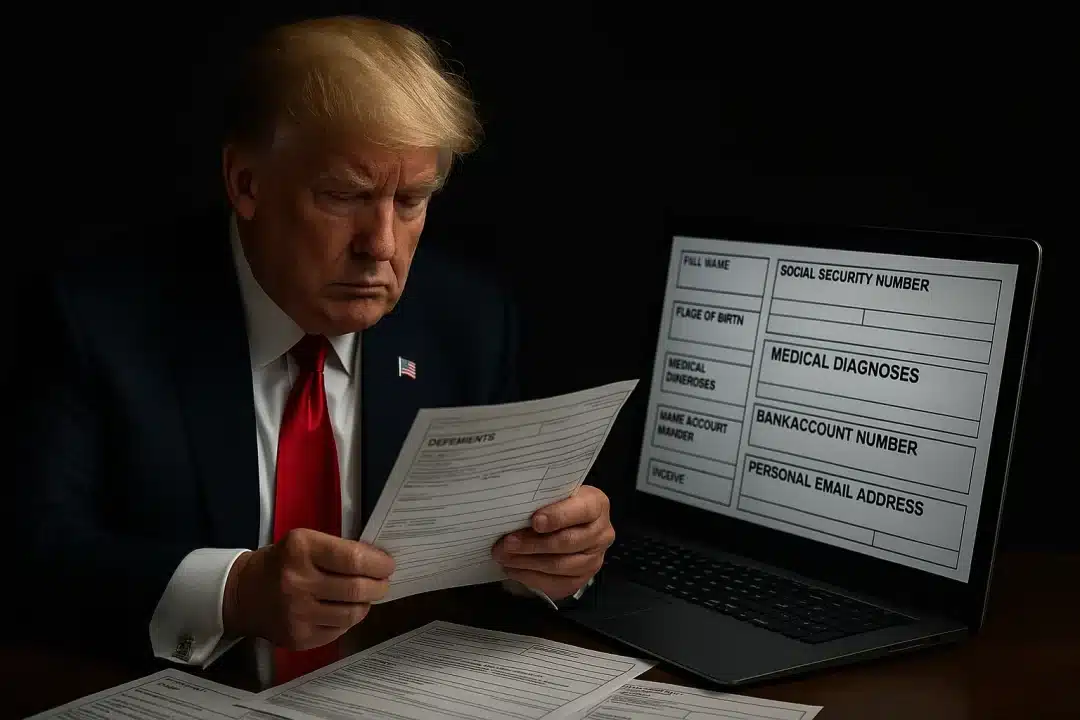
President Donald Trump has ignited a firestorm over privacy rights with a sweeping new executive order aimed at consolidating massive amounts of personal data held by the federal government. The move could create an unprecedented trove of information on nearly every person living in the United States—information that includes everything from Social Security numbers to medical diagnoses, student loan debt, and criminal records.
In March, Trump signed an executive order instructing federal agencies to dismantle “information silos” and share unclassified personal data across departments. The goal, according to the administration, is to root out waste, fraud, and abuse in government programs. But critics argue the initiative poses a historic threat to Americans’ privacy.
The Government’s Data Vault
According to internal records reviewed by The New York Times, the federal government maintains at least 300 data fields across 23 systems at eight agencies. These include:
- IRS records: Income, alimony, gambling winnings, bank account info, charitable contributions
- Social Security Administration: Disability status, benefit claims, employment history
- Department of Education: Student loan defaults, FAFSA data, parental income
- Health and Human Services: Medical diagnoses, Medicaid, Medicare payments
- Homeland Security: Immigration status, visa numbers
- Labor Department: Employment, wages, unemployment benefits
- Office of Personnel Management: Federal job applications, salary histories
This expansive repository includes deeply personal information such as biometric identifiers, addiction treatment history, veteran status, and even login credentials for government services.
Musk’s Role in the Push

Driving the effort behind the scenes is billionaire Elon Musk, who has been working through the Department of Government Efficiency (DOGE). His team has sought access to scores of databases across federal agencies, frequently clashing with internal watchdogs, privacy officers, and civil servants.
Court filings show DOGE’s access has been blocked by judges at several agencies, including the Social Security Administration. But an appeals court recently reversed an injunction, clearing the way for access to databases at the Treasury, Education Department, and Office of Personnel Management.
The IRS has already agreed to assist Homeland Security in using taxpayer data to help identify undocumented immigrants for deportation—a decision that prompted top IRS officials to consider resigning.
Legal Challenges and Privacy Concerns
Civil rights groups and public sector unions have filed more than a dozen lawsuits challenging the executive order. Critics argue that merging these data sets violates the 1974 Privacy Act, which restricts the use of personal information to the purpose for which it was originally collected.
Representative Jamie Raskin (D-MD) likened the initiative to data practices in authoritarian regimes, warning that it opens the door for political retaliation, surveillance of dissenters, and widespread data misuse.
“This is how authoritarian states operate,” Raskin said. “This database could be weaponized to punish critics or cut off benefits to vulnerable populations.”
Privacy experts are also sounding alarms over cybersecurity. With so much sensitive information centralized, the risk of a catastrophic breach from foreign adversaries like China or Russia increases significantly, according to national security analysts.
Efficiency vs. Rights
While the White House maintains that the consolidation is a necessary step to modernize and improve government efficiency, privacy advocates counter that the cost to civil liberties is far too high.
Julian Sanchez, a senior fellow at the Cato Institute, noted that Congress intentionally chose privacy over efficiency when it passed the Privacy Act in response to the Watergate scandal.
“We made a conscious decision to live with inefficiencies,” he said. “Because the dangers of centralizing all this data are simply too great.”
Technologists warn that consolidating disparate data sets—each with different definitions, standards, and formatting—could lead to false positives, especially if AI is used to flag potential fraud. Incorrect matches could result in denied benefits or wrongful targeting of individuals, experts caution.
What’s Next?
Whether the Trump administration will succeed in building this data super-system remains uncertain. Multiple lawsuits are still winding their way through the courts. Some judges have already ruled that Musk’s team lacks a legitimate need for access under existing federal laws.
Still, the administration has shown no sign of slowing down. Trump’s executive order calls for full agency compliance within 30 days and gives broad access to officials “designated by the president or agency heads.” It also seeks state-level data for federally funded programs.
Privacy advocates argue that what’s at stake is not just the misuse of information, but the very nature of American democracy.
“It’s not just about who knows your data,” said John Davisson of the Electronic Privacy Information Center. “It’s about what they can do with it.”
